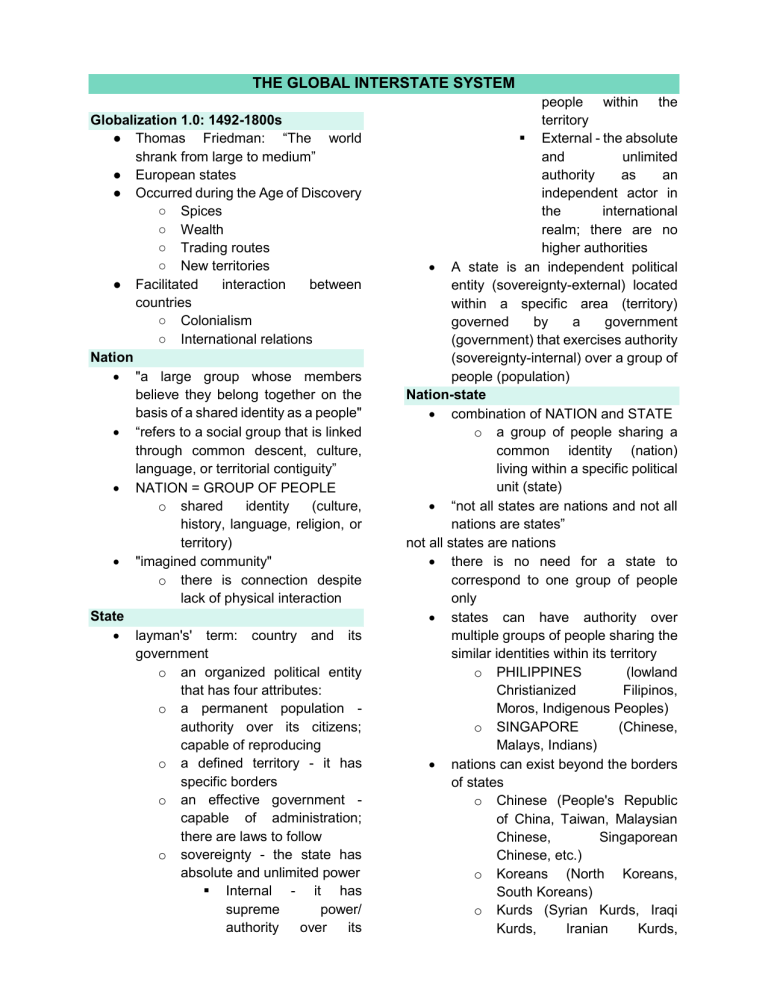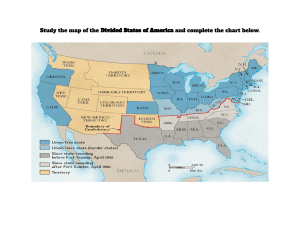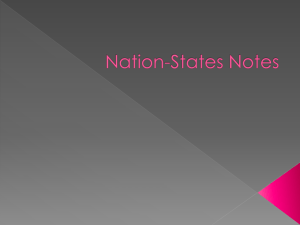
THE GLOBAL INTERSTATE SYSTEM Globalization 1.0: 1492-1800s ● Thomas Friedman: “The world shrank from large to medium” ● European states ● Occurred during the Age of Discovery ○ Spices ○ Wealth ○ Trading routes ○ New territories ● Facilitated interaction between countries ○ Colonialism ○ International relations Nation "a large group whose members believe they belong together on the basis of a shared identity as a people" “refers to a social group that is linked through common descent, culture, language, or territorial contiguity” NATION = GROUP OF PEOPLE o shared identity (culture, history, language, religion, or territory) "imagined community" o there is connection despite lack of physical interaction State layman's' term: country and its government o an organized political entity that has four attributes: o a permanent population authority over its citizens; capable of reproducing o a defined territory - it has specific borders o an effective government capable of administration; there are laws to follow o sovereignty - the state has absolute and unlimited power Internal - it has supreme power/ authority over its people within the territory External - the absolute and unlimited authority as an independent actor in the international realm; there are no higher authorities A state is an independent political entity (sovereignty-external) located within a specific area (territory) governed by a government (government) that exercises authority (sovereignty-internal) over a group of people (population) Nation-state combination of NATION and STATE o a group of people sharing a common identity (nation) living within a specific political unit (state) “not all states are nations and not all nations are states” not all states are nations there is no need for a state to correspond to one group of people only states can have authority over multiple groups of people sharing the similar identities within its territory o PHILIPPINES (lowland Christianized Filipinos, Moros, Indigenous Peoples) o SINGAPORE (Chinese, Malays, Indians) nations can exist beyond the borders of states o Chinese (People's Republic of China, Taiwan, Malaysian Chinese, Singaporean Chinese, etc.) o Koreans (North Koreans, South Koreans) o Kurds (Syrian Kurds, Iraqi Kurds, Iranian Kurds, Armenian Kurds) Kurds, STATE/INTERSTATE SYSTEM the world is composed of independent states that govern themselves o there is no higher authority that hold govern states o States are co-equal entities; they interact through diplomacy States are the most significant actor on the world stage o basic unit of global politics What makes it the most significant actor? Sovereignty - states' authority/power o states exercise unchallengeable power within their borders (the state controls the law) o states operate as independent and autonomous entities (no other state should interfere) Evolution Towards State System states emerged in Europe o European invention During the medieval period in Europe (500s to 1500s), Europe practiced feudalism as its political/economic system o it is a system of give and take Problems with feudalism o o Turkish allegiances are competing overlapping authorities over territories o territories are not properly defined Thirty Years’ War (1618-1648) o Started as a religious civil war o Soon, countries all over Europe joined to pursue their interests The war ended in 1648 through the Peace of Westphalia The Peace of Westphalia institutionalized important concepts that led to the state system today: o states are sovereign entities states are principal actors that are independent of each other no higher authority o states are co-equal actors it should not interfere with the internal/domestic affairs of other states o states should have defined territories territorial borders should be respected a state's authority is only effective within its borders These concepts became the foundation of the state system that is existing until today This European state system reached other territories around the world through colonization. European countries conquered various territories and imposed territorial boundaries. When colonized territories gained their independence, they adopted their former boundaries. Hence adopting the state system Throughout world history, there has been attempts to violate the principles of state sovereignty: o States invading other states o Territories being violated These attempts resulted to wars Nevertheless, the state system persists until this day. States in Today’s Globalized World States are major facilitators of globalization o colonization o Trade o States control domestic affairs o international relations Globalization 1.0 Despite the authority and independence of states in the world stage, the processes of today's globalization has affected it. Global Economy States' are especially threatened by the global economy and global economic flows o BEFORE: the economy is constrained within the borders of the state's territory o NOW: national economies have been integrated into single global market economy economic problems in the global level = problems in the local level states cannot anymore control global economic flows o Pandemic o War in Ukraine Criminality Despite states' power to exercise the full might of the law within its borders, this power has been eroded by the influx of new forms of crime o drug trade o money laundering o human trafficking o Disinformation These crimes have been made possible by the development and continual refinement of technologies of all sorts. o Due to technology, they are difficult to trace Diseases The spread of global diseases have been a common occurrence in the 21st century o AIDS o tuberculosis o SARS o COVID-19 o Monkeypox The flow of people in and out of each state has made it extremely difficult to contain the spread of diseases. States cannot address the spread of these diseases alone. Climate Change Climate change is a global phenomenon. It is not caused by a single state. Each country faces various consequences. States have the authority to implement programs to address the impact of climate change. However, the effectivity of these programs are only limited. A state cannot control world temperature or decrease the damage of a storm. International Institutions The state has also been weakened by the growing power of global and transnational organizations that operate largely free of the control of nation-states. o These organizations affect states by imposing rules, suggesting policies, pressuring leaders, and more. Are states still relevant in today’s world? Though the world is globally interconnected nowadays, most human activities occur at the national level. o economic activity takes place within state borders than it does across state borders o these economic activities are still regulated by the state it is misleading to suggest that globalization disempowers states o states choose to engage in the global economy and do so for reasons of national selfinterest o Globalization is an opportunity for states to grow and initiate cooperation States continue to be the most dominant actors in the world stage. o States exercise power in a way and to an extent that no other actor can. o states have the machinery (government and its agencies) to make something possible people continue to adhere to the state system o As most states are nationstates, this is ensured by the survival of nationalism (national identity) o nationalism remains to be the strongest ideological force in the world Economic globalization is made possible by states' control of the internal affairs o the global economy can only work successfully in conditions of legal and social order that only states can guarantee




